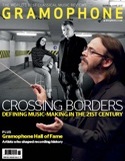Texte paru dans: / Appeared in: |
|
|
Outil de traduction (Très approximatif) |
|
|
Reviewer:
Malcolm Riley On this disc Frescobaldi is mostly in devotional mood, providing short movements with nothing lasting more than seven minutes. He could have wished for no more persuasive an advocate than Bernard Foccroulle who, once again, has meticulously matched his repertory to a trio of historically correct Italian organs. Despite their bijou dimensions (none containing no more than 10 stops) they each have a distinctive character. The oldest (1509), in the church of St Francesco in Trevi, takes the lion’s share of the programme. However, Rome’s Santa Barbara dei Librari (c1600) is the setting for the extraordinarily rich and adventurous Toccata quinta and the exhilarating Toccata nona (both 1627), which rounds off the programme. If an hour of early 17th-century organ music seems too much of a good thing, fortunately Foccroulle’s daughter, Alice, sings three soprano motets taken from the Liber secundus sacrarum modulationum collection. Her dulcet tone provides a soothing contrast to some of the astringency of the untempered organ ranks. Further variety is provided by Lambert Colson and his mournful cornett in the Fantasia quarta of 1608. Although the accompanying documentation is helpful, there are two annoying mistakes in the track-listing. |
|




